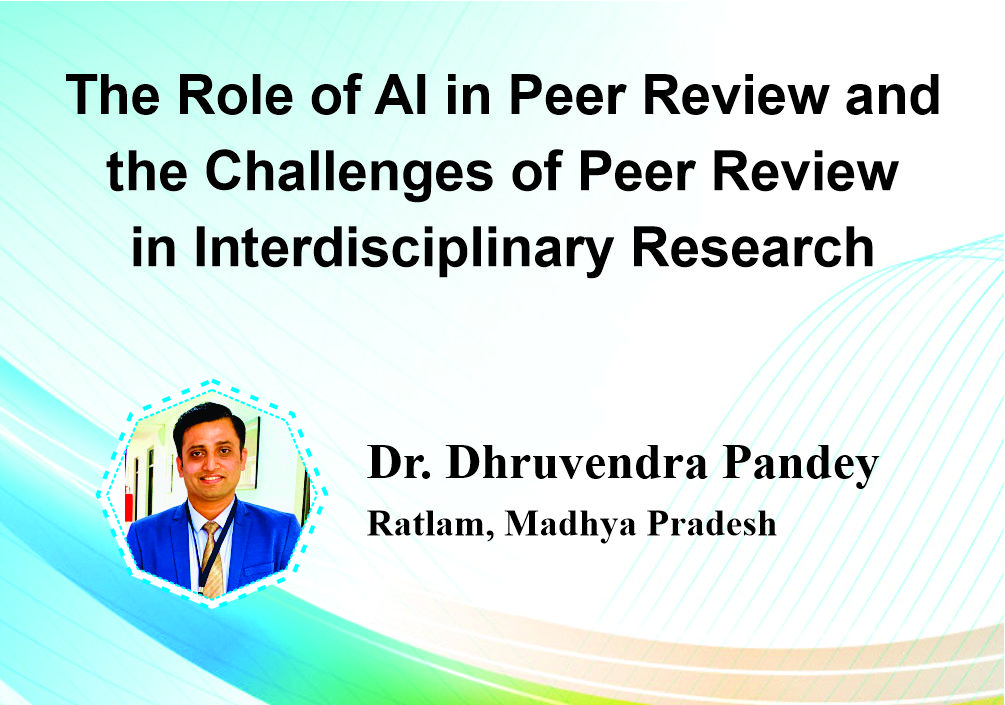Overview
The core principle of academic publishing is peer review, which ensures the validity, precision, and caliber of research. However, the conventional peer-review method confronts major obstacles as the amount and complexity of scientific output increase, especially in interdisciplinary fields. The emergence of artificial intelligence (AI) presents both new challenges and intriguing answers. Let’s examine how AI functions in peer review as well as the particular difficulties that come with interdisciplinary research.
The Role of AI in Peer Review
1. Automated Quality Checks
By automating time-consuming but necessary processes, AI systems can expedite the peer-review process by Identify instances of plagiarism ,Check the authenticity of the data and Verify that the citations are accurate and that the formatting rules are being followed..
2. Strengthening Objectivity
In peer review, bias — conscious or unconscious — remains a problem. Large datasets have educated AI systems to provide unbiased evaluations by Finding methodological flaws ,Pointing out discrepancies in the information or outcomes and Assessing the cohesion and clarity of the language.
3. Assigning Manuscripts to reviewers
By evaluating potential reviewers’ areas of expertise and pairing them with pertinent papers, AI can streamline the reviewer selection process. This guarantees that reviewers possess the necessary skills to properly assess the job.
4. Enhancing Accessibility and Inclusivity
Peer review involvement from around the world is frequently hampered by language problems. This gap can be filled by AI-powered language translation technologies, allowing researchers from many backgrounds to make significant contributions.
Challenges of Peer Review in Interdisciplinary Research
1. Knowledge Silos
Since interdisciplinary research frequently crosses several domains, reviewers with a variety of specialties are needed. It is difficult to find people who are able to assess both the technical and contextual components of such work.
2. Bias Against Novelty
During peer review, innovative interdisciplinary work frequently encounters skepticism. Unconventional approaches or viewpoints may be seen as less credible by reviewers who are well-established in their disciplines..
3. Challenges of Standardization
A consistent framework for evaluation is frequently absent from interdisciplinary research. Such work may have an impact that is not fully captured by traditional measurements.
4. Communication Barriers
Clear communication of complicated concepts is necessary for effective peer review, but multidisciplinary research sometimes incorporates jargon from several disciplines. By recognizing unclear language and offering clarifications, artificial intelligence (AI) systems can help people communicate more clearly.
Ethical Concerns
While AI gives us numerous advantages, its integration into peer review must be approached cautiously. There must be some key ethical concerns related to use of AI which include:
- Transparency.
- Bias in AI Models
- Reviewer Replacement issues.
“We all need people who will give us feedback. That’s how we improve.”
Bill gates
“With the increasing concern about research reproducibility and research integrity, we need more eyes on new finding to stop issues and concerns.”
Rebecca Lawrence
Conclusion
Peer review could undergo a revolution by virtue of AI’s ability to increase productivity, impartiality, and inclusion. To handle ethical issues and the particular difficulties of multidisciplinary research, its implementation must be properly controlled. The academic community may promote a more thorough and fair peer-review process and ultimately push the boundaries of knowledge by prudently employing AI.

